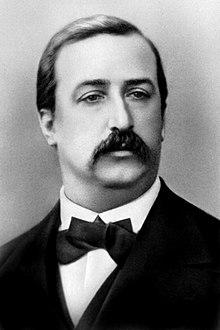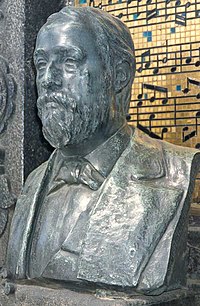Alexander Borodin: Difference between revisions
Gclefdavis (talk | contribs) No edit summary |
Gclefdavis (talk | contribs) No edit summary |
||
| Line 120: | Line 120: | ||
| pages = 429–436 |
| pages = 429–436 |
||
| doi = 10.2307/1578707}} |
| doi = 10.2307/1578707}} |
||
+ * Richard Beattie Davis `Beauty of Belaieff` (Bedford 2008) ISBN 978-1-905912-14-8 http://www.GClefpublishing.com |
|||
{{commons|Alexander Borodin}} |
{{commons|Alexander Borodin}} |
||
Revision as of 14:39, 22 April 2009
Alexander Borodin | |
|---|---|
 Alexander Borodin | |
| Born | November 12, 1833 |
| Died | February 27, 1887 (aged 53) |
| Nationality | |
| Scientific career | |
| Fields | composer chemist |
| Doctoral advisor | Nikolay Zinin |
Alexander Porfiryevich Borodin (Russian: Александр Порфирьевич Бородин, Aleksandr Porfir'evič Borodin) (12 November [O.S. 31 October] 1833 – 27 February [O.S. 15 February] 1887) was a Russian composer of Georgian-Russian parentage who made his living as a notable chemist. He was a member of the group of composers called The Five (or "The Mighty Handful"), who were dedicated to producing a specifically Russian kind of art music.[1][2][3] He is best known for his symphonies, his two string quartets, and his opera Prince Igor, and for later providing the musical inspiration for the musical Kismet.
Life and profession
Borodin was born in Saint Petersburg, the illegitimate son of a Georgian noble (saeklesio aznauri), Luka Gedevanishvili (Georgian: [] Error: {{Lang}}: no text (help) ლუკა სიმონის ძე გედევანიშვილი) and a Russian mother, the 25 year old Evdokia Konstantinovna Antonova (Евдокия Константиновна Антонова), who had him registered instead as the son of one of his serfs, Porfiry Borodin. As a boy he received a good education, including piano lessons. He was eventually to earn a doctorate in medicine at the Medico–Surgical Academy, the later home to Ivan Pavlov, and to pursue a career in chemistry (just as his comrade César Cui would do in the field of military fortifications). As a result of his work in chemistry and difficulties in his home-life, Borodin was not as prolific in writing music as many of his contemporaries were - hence his own description of himself as a "Sunday composer." He died during a festive ball, where he was participating with much vigor; he suddenly collapsed from heart failure. He was interred in Tikhvin Cemetery at the Alexander Nevsky Monastery, in Saint Petersburg.
Chemical career
In his chemical profession Borodin gained great respect, being particularly noted for his work on aldehydes[4]. Between 1859 and 1862 Borodin held a postdoctorate in Heidelberg. He worked in the laboratory of Emil Erlenmeyer working on benzene derivatives. He also spent time in Pisa, working on organic halogens. One experiment published in 1862 described the first nucleophilic displacement of chlorine by fluorine in benzoyl chloride[5]. A related reaction known to the west as the Hunsdiecker reaction published in 1939 by the Hunsdieckers was promoted by the Soviet Union as the Borodin reaction. In 1862 he returned to the Medico–Surgical Academy. There he worked on the self-condensation of small aldehydes with publications in 1864 and 1869 and in this field he found himself competing with August Kekulé.
Borodin is also credited with the discovery of the Aldol reaction together with Charles-Adolphe Wurtz. In 1872 he announced to the Russian Chemical Society the discovery of a new by-product in aldehyde reactions with properties like that of an alcohol and he noted similarities with compounds already discussed in publications by Wurtz from the same year.
He published his last full article in 1875 on reactions of amides and his last publication concerned a method for the identification of urea in animal urine.
His son-in-law and successor was fellow chemist A. P. Dianin.
Musical avocation
Opera and orchestral works
Borodin met Mily Balakirev in 1862. While under his tutelage in composition he began his Symphony No. 1 in E flat major; it was first performed in 1869, with Balakirev conducting. In that same year Borodin started on his Symphony No. 2 in B minor, which was not particularly successful at its premiere in 1877 under Eduard Nápravník, but with some minor re-orchestration received a successful performance in 1879 by the Free Music School under Rimsky-Korsakov's direction. In 1880 he composed the popular symphonic poem In the Steppes of Central Asia. Two years later he began composing a third symphony, but left it unfinished at his death; two movements of it were later completed and orchestrated by Glazunov.
In 1869, Borodin became distracted from initial work on the second symphony by preoccupation with the opera Prince Igor, which is seen by some to be his most significant work and one of the most important historical Russian operas. It contains the Polovetsian Dances, which are often performed as a stand-alone concert work as probably Borodin's best known composition. Unfortunately Borodin left the opera (and a few other works) incomplete at his death. Prince Igor was completed posthumously by Rimsky-Korsakov and Glazunov.
Chamber music
No other member of the Balakirev circle identified himself so openly with absolute music as Borodin did in his two string quartets. Himself a cellist, he was an enthusiastic chamber music player, an interest deepened during his chemical studies in Heidelberg between 1859 and 1861. This early period yielded, among other chamber works, a string sextet and a piano quintet. In thematic structure and instrumental texture he based his pieces on those of Felix Mendelssohn.[6]
In 1875 he started on his First String Quartet, much to the displeasure of Mussorgsky and Vladimir Stasov. That Borodin did so in the company of The Five, which was hostile to chamber music, speaks to his independence. From the First Quartet on he displayed mastery in the form. His Second Quartet, in which his strong lyricism is represented in the popular "Nocturne" followed in 1881. The First Quartet is richest in changes of mood. The Second Quartet has a more uniform atmosphere and expression.[6]
Musical legacy

Borodin's fame outside the Russian Empire was made possible during his lifetime by Franz Liszt, who arranged a performance of the Symphony No. 1 in Germany in 1880, and by Comtesse de Mercy-Argenteau in Belgium and France. His music is noted for its strong lyricism and rich harmonies. Along with some influences from Western composers, as a member of the The Five his music exudes also an undeniably Russian flavor. His passionate music and unusual harmonies proved to have a lasting influence on the younger French composers Debussy and Ravel (in homage, the latter composed in 1913 a piano piece entitled "À la manière de Borodine").
The evocative characteristics of Borodin's music made possible the adaptation of his compositions in the 1953 musical Kismet, by Robert Wright and George Forrest, perhaps most notably in the song, Stranger In Paradise. In 1954, Borodin was posthumously awarded a Tony Award for this show.
Related information
- The Borodin String Quartet was named in his honour.
- The chemist Alexander Shulgin uses the name "Alexander Borodin" as a fictional persona in the books PiHKAL and TiHKAL.
External links
- Template:WIMA
- List of compositions Template:De icon
- Free scores by Borodin at the International Music Score Library Project (IMSLP)
- Florida Atlantic University `Richard Beattie Davis Music Collection` http://www.library.fau.edu/depts/spc/davis.htm
References
- ^ Abraham, Gerald. Borodin: the Composer and his Music. London, 1927.
- ^ Dianin, Sergei Aleksandrovich. Borodin. London, New York, Oxford University Press, 1963.
- ^ Oldani, Robert, William. "Borodin, Aleksandr Porfir′yevich," Grove Music Online (Accessed 27 January 2006, subscription required)
- ^ Michael D. Gordin (2006). "Facing the Music: How Original Was Borodin's Chemistry?" (PDF). Journal of Chemical Education. 83: 561–566.
- ^ E. J. Behrman (2006). "Borodin?" (PDF). Journal of Chemical Education. 83: 1138.
- ^ a b Maes, 72.
- Maes, Francis, tr. Pomerans, Arnold J. and Erica Pomerans, A History of Russian Music: From Kamarinskaya to Babi Yar (Berkeley, Los Angeles and London: University of California Press, 2002). ISBN 0-520-21815-9.
- + * Richard Beattie Davis `Beauty of Belaieff` (London 2008) ISBN 978-1-905912-14-8
http://www.GClefpublishing.com
- George Sarton (1939). "Borodin (1833-87)". Osiris. 7: 224–260. doi:10.1086/368505.
- A. J. B. Hutchings (1936). "A Study of Borodin: I. The Man". The Musical Times. 77 (1124): 881–883. doi:10.2307/920565.
- George B. Kauffman, Kathryn Bumpass (1988). "An Apparent Conflict between Art and Science: The Case of Aleksandr Porfir'evich Borodin (1833-1887)". Leonardo. 21 (4): 429–436. doi:10.2307/1578707.
